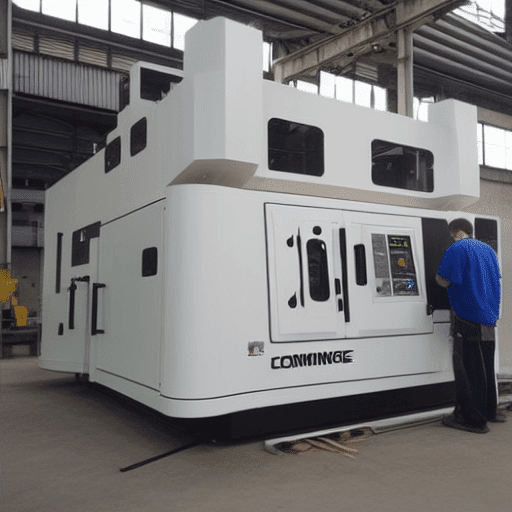CNC stands for Computerized Numerical Control. It is a computerized manufacturing process in which pre-programmed software and code controls the movement of production equipment. In a CNC machine shop, this process is used to produce metal parts with a high degree of accuracy. The first step in the CNC process is to create a program that will control the machine’s movements. This program is typically created using a CAD (computer-aided design) or CAM (computer-aided manufacturing) software. Once the program is complete, it is loaded into the CNC machine. The machine then uses the program to guide it through the machining process, creating the desired part. CNC technology has revolutionized manufacturing, making it possible to create parts with intricate designs and high levels of precision.
Are CNC shops profitable?
Are CNC shops profitable? The answer may depend on how you define “profitable.” A business that generates a 10 to 15 percent net profit margin is certainly profitable in the sense that it is generating more revenue than it is spending. The business owner may not receive a significant salary from it. A good part of the profits are usually reinvested into the business to cover expenses and support its expansion. For instance, a shop making 400,000 dollars in annual revenue with a profit margin ranging from 10 to 15 percent would yield 40,000 to 70,000 dollars profits. While this might appear substantial, it needs to cover various costs such as overhead expenses, employee wages, and other operational outlays. The actual salary of the business owner might only be a fraction of this profit. A CNC shop can still be considered profitable as long as its revenue exceeds its expenses.
What machines do I need for a machine shop?
Before setting up a machine shop, it’s important to carefully consider what types of machines and equipment will be needed in order to produce parts effectively. Generally speaking, a machine shop will require the following:
- Milling machine: Used for shaping metal and other materials by using rotary cutters.
- Metal lathe machine: Used for shaping cylindrical parts by cutting and removing material.
- Multitasking machine: A combination of a milling machine and lathe machine, capable of performing multiple operations on a workpiece.
- Machining center: A complex machine that can perform various operations such as drilling, boring, and milling.
- Grinding machine: Used for finishing surfaces by grinding away small amounts of material.
- Drill press: Used for creating holes by drilling into a workpiece.
- Welding machine: Used for joining materials together by creating heat and pressure.
- Inspection equipment: Used to measure the dimensions and tolerances of parts.
Every machine serves a distinct purpose, and the ideal combination of machines relies on the specific parts that require production. By dedicating time to carefully select the appropriate machines from the start, it becomes feasible to establish a highly efficient and effective production process.
What skills do you need to work in a machine shop?
To be successful in a machine shop, there are several essential skills you must possess. Firstly, a comprehensive understanding of shop equipment, including drill presses and CNC machines, is crucial. Familiarity with machine parts and their interactions is also necessary.
Secondly, strong safety skills are vital. It is imperative to adhere to safety guidelines diligently when working with hazardous machinery to avoid accidents and ensure a secure work environment.
Lastly, having experience with raw materials is essential. You should be capable of selecting the appropriate materials for each project and possess the know-how to cut and shape them accurately. By possessing these skills, you will enhance your prospects for success in any machine shop setting.
How can I start my own machine business?
Starting your own machine business is a frequently asked question among aspiring entrepreneurs. There are crucial steps to follow to guarantee success. First and foremost, conduct a comprehensive market study to grasp the needs of potential customers. Then, analyze your competitors to craft a distinctive selling proposition. With these preliminary steps accomplished, establish a budget and commence your business’s advertising efforts. Lastly, ensure efficient stock management. By adhering to these straightforward guidelines, you’ll be on the path to launching a thriving machine business.
Expert advise on working in a machine shop
- Always prioritize safety: Wear appropriate personal protective equipment (PPE) such as safety goggles, gloves, and ear protection. Follow safety guidelines when operating machinery and handling materials.
- Master the basics: Develop a solid understanding of fundamental machining principles, including cutting speeds, feeds, and tool selection. Practice on simple projects before moving on to complex ones.
- Maintain a clean workspace: Regularly clean and organize the machine shop area. A clutter-free environment enhances productivity and reduces the risk of accidents.
- Plan and measure carefully: Always begin with a well-thought-out plan and accurate measurements. Double-check dimensions before making any cuts to avoid costly mistakes.
- Continuously learn and improve: Stay updated on new machining techniques and technologies. Attend workshops, seminars, and training programs to enhance your skills and knowledge.
- Collaborate and seek guidance: Don’t hesitate to seek advice from experienced machinists when facing challenging tasks. Collaborate with colleagues to share knowledge and solve problems effectively.
- Embrace quality control: Inspect finished parts regularly to ensure they meet specifications. Implement quality control processes to minimize errors and maintain high standards.
- Be patient and attentive: Machining requires precision and attention to detail. Avoid rushing through tasks and remain focused to achieve accurate results.
- Adapt to different materials: Familiarize yourself with working on various materials like metals, plastics, or composites. Each material may require different tools and techniques.
- Prioritize tool and machine maintenance: Regularly inspect and maintain machines to keep them in optimal condition. Dull or damaged tools should be replaced promptly to ensure quality output.
- Foster a positive work environment: Promote teamwork and respect among coworkers. A supportive and positive atmosphere encourages better productivity and creativity.
